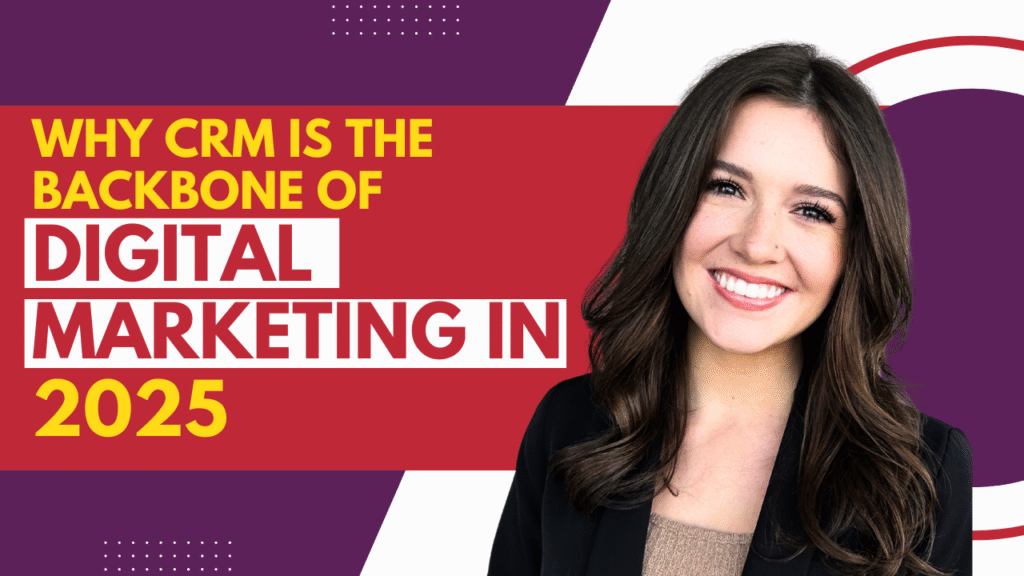
In 2025, digital marketing isn’t just about catchy ads or social media campaigns—it’s about creating personalized, data-driven experiences that turn prospects into loyal customers. At the core of this transformation lies CRM (Customer Relationship Management). Once seen as a sales-only tool, CRM in digital marketing 2025 has evolved into the backbone of modern strategies, empowering businesses to collect customer data, build relationships, and deliver targeted campaigns that drive measurable ROI.
Let’s explore why CRM has become indispensable for businesses investing in digital marketing growth strategies.
1. Data Is the New Currency — and CRM Is the Vault
Marketing thrives on customer data, but raw information is meaningless without context. A CRM software for digital marketing consolidates data from multiple touchpoints—social media, websites, email, ads, and offline interactions—into a single customer view.
In 2025, with stricter privacy laws (GDPR, CCPA, and AI-driven compliance), businesses can’t afford scattered or mismanaged data. CRM ensures data accuracy, compliance, and actionable insights—helping marketers make smarter, ethical marketing decisions.
2. Hyper-Personalization at Scale
Generic campaigns no longer work. Today’s consumers expect 1:1 personalization in marketing, from the emails they open to the ads they see.
A CRM marketing strategy uses customer history, preferences, and behavior to create tailored experiences—like recommending the right product, sending reminders at the perfect time, or offering discounts just when a buyer is likely to convert.
With AI-powered CRM tools, personalization in 2025 is faster, predictive, and more accurate than ever before.
3. Seamless Omnichannel Marketing
Consumers interact with brands across multiple platforms—Instagram, WhatsApp, emails, websites, and even voice assistants. Without CRM, managing these touchpoints feels like juggling in the dark.
A CRM system for omnichannel marketing ensures consistent messaging and experiences across all platforms. That’s why leading brands in 2025 use CRM as the central hub of customer engagement.
4. Predictive Analytics for Smarter Campaigns
In 2025, marketing isn’t just reactive—it’s predictive. CRM analytics in digital marketing help forecast customer needs, churn risks, and buying cycles.
Imagine launching a campaign that targets customers right before they run out of a product or identifying leads that are most likely to convert. Predictive CRM tools make this possible, boosting conversion rates and cutting costs.
5. Enhanced Customer Retention
Happy customers don’t just return—they become brand advocates, sharing reviews, referrals, and user-generated content that amplify your digital marketing campaigns.
Acquiring new customers is five times costlier than retaining existing ones. CRM solutions for customer retention track satisfaction, purchase history, and support interactions, enabling marketers to build loyalty-driven campaigns.
6. Streamlined Collaboration Between Sales & Marketing
In many companies, sales and marketing still work in silos. A CRM platform for sales and marketing alignment bridges this gap by providing both teams with a shared database of leads and opportunities.
- Marketing teams can nurture leads with relevant content.
- Sales teams can close deals faster with customer behavior insights.
This alignment creates a seamless buyer journey, turning qualified leads into paying customers.
7. CRM and Marketing Automation Go Hand-in-Hand
In 2025, time is the biggest currency. With CRM marketing automation, businesses can:
- Send automated email campaigns.
- Trigger personalized SMS/WhatsApp messages.
- Retarget customers with behavior-based ads.
This combination leads to higher engagement, lower manual effort, and more ROI from digital marketing campaigns.
8. Future-Proofing Against AI Disruption
As AI reshapes digital marketing, CRM acts as the foundation. AI-driven CRM software fuels chatbots, personalized recommendations, and ad spend optimization with structured, reliable data.
Businesses that adopt AI + CRM integration in 2025 are not just keeping up with trends—they’re staying ahead of competitors.
CRM Is No Longer Optional
In 2025, a business without CRM is like a car without an engine—it may look good on the outside but won’t go very far. CRM is the backbone of digital marketing, ensuring every campaign is data-driven, personalized, and future-ready.
For businesses aiming to scale in this competitive era, investing in a best CRM software for digital marketing is no longer a choice—it’s a strategic necessity.

